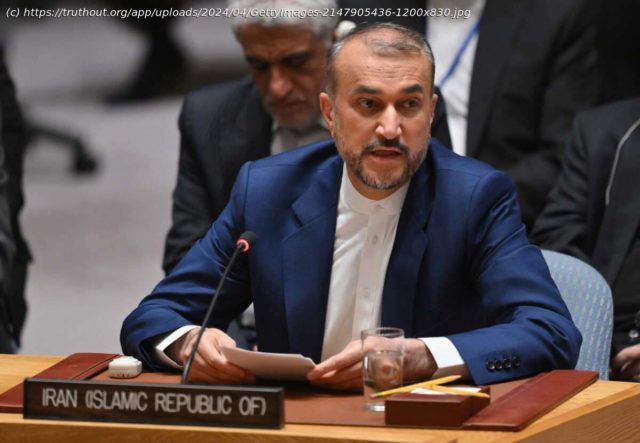Iran’s attack on Israel was lawful self-defense carried out in compliance with international humanitarian law.
On April 1, Israel mounted an unprovoked military attack on a building that was part of the Iranian Embassy complex in Damascus, Syria, killing seven of Iran’s senior military advisers and five additional people. The victims included Gen. Mohamad Reza Zahedi, head of Iran’s covert military operations in Lebanon and Syria, and two other senior generals.
Although Israel’s attack violated the United Nations Charter, the UN Security Council refused to condemn it because the United States, the U.K. and France exercised their vetoes on April 4.
Iran considered this attack on its consulate “an act of war,” Trita Parsi wrote at Foreign Policy.
On April 11, the Permanent Mission of the Islamic Republic of Iran to the United Nations stated: “Had the UN Security Council condemned the Zionist regime’s reprehensible act of aggression on our diplomatic premises in Damascus and subsequently brought to justice its perpetrators, the imperative for Iran to punish this rogue regime might have been obviated.”
Then, on April 13, in response to Israel’s attack, Iran fired more than 300 drones and missiles at the Israeli air base from which the April 1 attacks had emanated. Only two of them landed inside Israel and no one was killed; a Bedouin girl was injured. The U.S., U.K., France, Jordan and Israel intercepted the remaining Iranian missiles and drones. A senior U.S. military official said “there’s no significant damage within Israel itself.”
The Iranian mission to the UN wrote in an April 13 letter to the UN secretary-general that Iran’s action was conducted “in the exercise of Iran’s inherent right to self-defense” under Article 51 of the UN Charter “and in response to the Israeli recurring military aggressions, particularly its armed attack” on April 1 “against Iranian diplomatic premises, in the defiance of Article 2(4) of the Charter of the United Nations.”
The April 1 attack was not the first time Israel had attacked key Iranian personnel. In 2020, Israel killed Iran’s leading nuclear scientist on Iranian soil. Since December, Israel has assassinated at least 18 Iranian military commanders and staff. Iran suspects that Israel played a role in the assassination of nuclear scientists in 2010 and 2012.
Also, “Israel carried out covert attacks on two major natural gas pipelines inside Iran” in February, “disrupting the flow of heat and cooking gas to provinces with millions of people,” The New York Times reported. “The level of impact was very high because these are two significant pipelines going south to north,” according to Homayoun Falakshahi, a senior energy analyst at the data analytics firm Kpler. “We have never seen anything like this in scale and scope.”
Iran’s April 13 letter said the Security Council “has failed in its duty to maintain international peace and security, allowing the Israeli regime to transgress red lines and violate the fundamental principles of international law” which “exacerbated tensions in the region and threatened regional and international peace and security.”
Besides “warning about any further military provocations” by Israel, Iran pledged to “defend its people, national security and interests, sovereignty and territorial integrity against any threat or acts of aggression and to respond to any such threat or aggression vigorously and in accordance with international law.”
Iran added that it “will not hesitate to exercise its inherent right of self-defense when required.” It warned that if Israel commits “any military aggression again, Iran’s response will assuredly and decisively be stronger, and more resolute.”
In addition, Iran made clear that it seeks to avoid further escalation that could spark a widespread regional war. An April 13 social media post from Iran’s permanent mission to the UN stated, “The matter can be deemed concluded. However, should the Israeli regime make another mistake, Iran’s response will be considerably more severe. It is a conflict between Iran and the rogue Israeli regime, from which the U.S. MUST STAY AWAY!”
At a Security Council meeting on April 14, Iran’s UN Ambassador Saeid Iravani defended the lawfulness of the missile and drone attack on Israel. He noted the hypocrisy of the U.
Home
United States
USA — Criminal Under UN Charter, Iran’s Attack Was a Legal Response to Israel’s Illegal...






